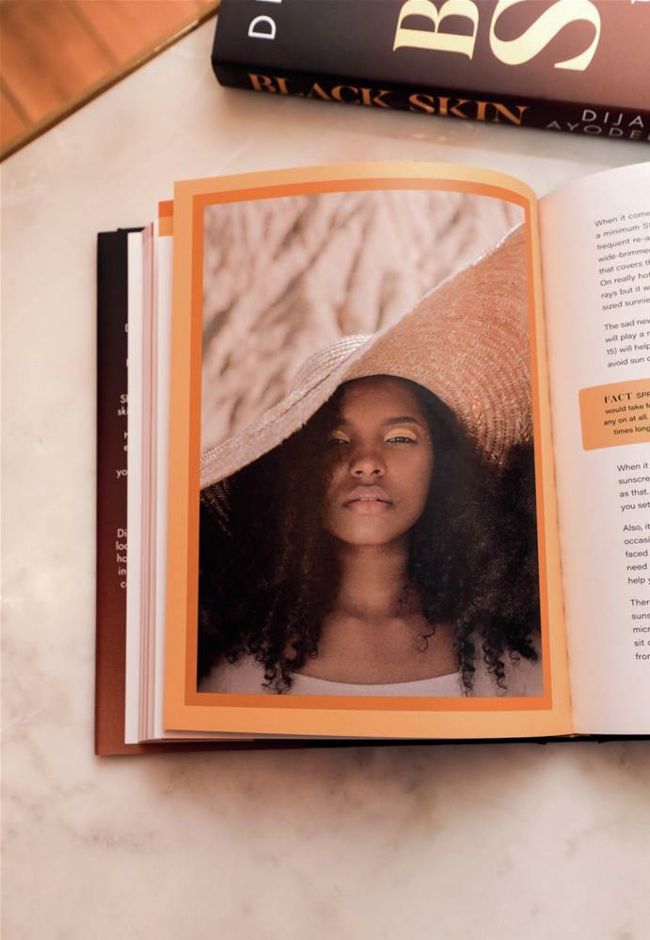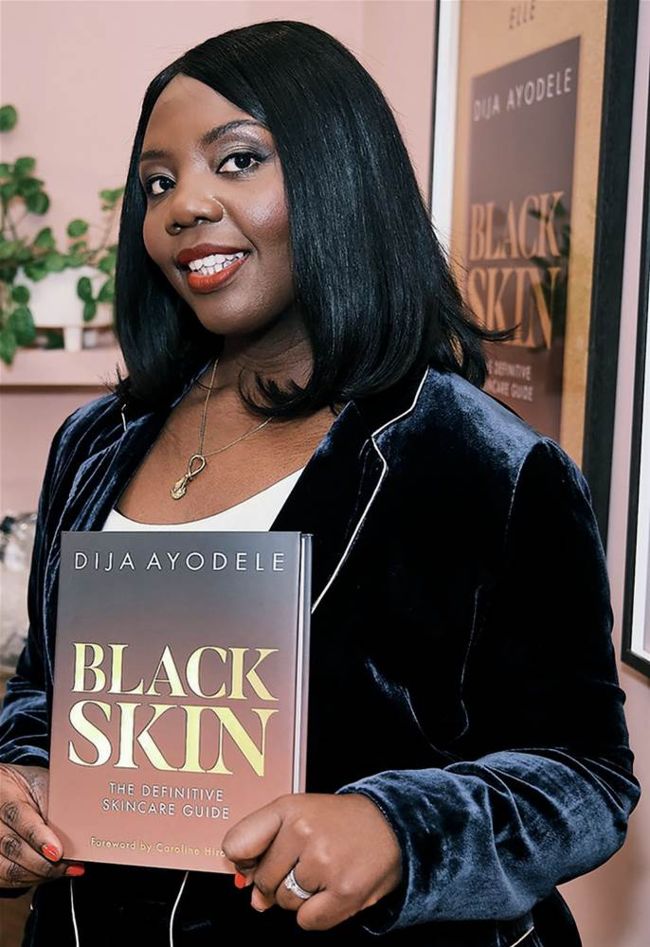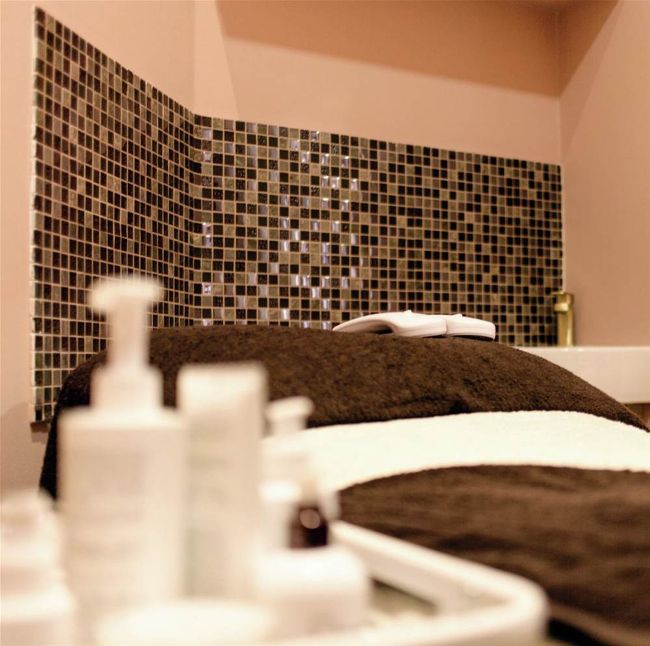INTERVIEW
TALKING TO… DIJA AYODELE
The aestheticianturned-author tells Amanda Pauley about the inspiration behind her new book Black Skin, making beauty education even more inclusive, and why she’s taking to the stage at PB London 2022
Aesthetician Dija Ayodele is well known as an advocate for diversity and inclusion within the beauty sector.
Not only is she the owner of successful destination for women of colour West Room Aesthetics clinic in London, but she is also founder of the award-winning Black Skin Directory –a platform which connects people of colour with professionals who are experienced in treating darker skin; a key member of the British Beauty Council’s advisory board; and a passionate educator who wants to help beauty therapists understand skin at every level.

The reception area in West Room Aesthetics
Ayodele has now directed her wisdom into the printed word with the launch of her first book, Black Skin: The Definitive Skincare Guide, a comprehensive and practical guide on black skin, covering concerns such as hyperpigmentation, skin discolouration and keloid scars. It also traces the historical relationship between blackness and the beauty industry.
Not only is it beautiful and informative, but there’s all kinds of representation in the book, “with images ranging from older and younger black women to children, men, a woman in a hijab, a bald-headed woman and more,” says Ayodele.
Changing the narrative
When the book launched in November 2021, it naturally made headlines, with rave reviews from both the public and the profession. “Usually, when beauty books are written, there’s just a chapter on black skin, but I wanted to change the narrative and do something that champions and is completely focused on how to look after black skin. For a long time, the beauty industry has been default white, so I wanted to do something that would centre black women,” says Ayodele.
“When black women don’t see an image of themselves in something, they assume it’s not necessarily for them, and I really wanted to alleviate some of that legwork and anxiety. I also wanted to do a historical piece that charts the relationship and journey of black skin and the beauty industry over the course of the past 400 years so it had a real point of difference.”
Although the book’s number-one market is black women – with many having messaged to say they “finally feel visible within beauty” because of it, which Ayodele said was very affirming for her – it has many stakeholder groups. The secondary, she says, being the beauty industry eco-system, so professionals can be much more clued up – many clinics and salons have bought the book for themselves and their teams.
“I wanted therapists to be able to pick up the book and learn something from it they could apply to practice themselves, which is why there are parts written specifically for professionals who want to know more. For example, a consumer might not want to know about encapsulation, but therapists will, so this will be a tool that they can use,” she says.

Imagery featured in Ayodele’s book Black Skin
However, Ayodele says more needs to be done in general to raise the level of education, especially when it comes to mindset and language. “The language used around black skin needs to be turned around. Yes, it’s got some differences, but that doesn’t make it complex, hard or challenging – and these are words I hear people using all the time,” she says.
“When I have a client in clinic, I don’t look at her and think she’s got dark skin, I think about her skin condition first – for example, she’s got acne – and her skin colour comes secon.
“Then I think, what can I do so I don’t impact things like melanin, and all this comes from education.” As such, Ayodele believes the curriculum needs to be adapted, stating that it’s not expansive enough from the grass roots.
“When you study Level 2, there’s very little information about skin colour but the differences in that should be discussed from the get-go – that information should be basic. If you study Level 4 then there’s some differentiation when talking about skin colour, but not everyone does a Level 4,” she says.
“For example, there’s a new dermatology textbook coming out and there’s a chapter within it on black skin, but dark skin should be featured throughout the entire thing.
Someone could choose not to read that chapter because it doesn’t apply to them, but if you make it a non-negotiable on the curriculum then things like mindset and language will naturally sort themselves out.”
Creating a new experience
A big project that Ayodele has lined up for this year is an overhaul of the Black Skin Directory (BSD) website in celebration of its fifth anniversary, and this will involve the launch of a new logo and an education platform. “We’ve turned the content of the BSD workshop we did before into online training, which will be Babtac-approved,” she says. “A lot of education needs to start from when people enter the industry, so it’s aimed at Level 2 upwards.”

Ayodele holding her book Black Skin
Ayodele is also looking to expand West Room Aesthetics’ audience to focus more on skin and lifestyle management. “We know a lot of our clients come to us not just for skin, they ask our advice on things like nutrition and make-up too,” she says.
“This year, we’re going to be focusing more on Skin+ services, which stands for everything else that comes alongside skin, bridging that gap to make skincare more of a lifestyle experience.” In the future, the clinic could even move to a new space due to capacity constraints – it is currently running with a four-week waiting list. “It’s a good problem to have to be in demand but there are downsides too because if people wait for too long then they will just go somewhere else,” explains Ayodele.
“It’s an exciting prospect to have to consider but first we will need to get another therapist in to help spread the workload so people can get appointments quicker.” When it comes to recruiting, Ayodele says it’s the level of qualification that’s been the biggest issue for her.
“We’re looking for a Level 4 employee but Level 4 costs so much money that not many therapists do it, and those who do then want to work for themselves. We’re getting lots of Level 3 therapists apply, but now I’m in a bit of a conundrum. Do I hire an experienced Level 3 and invest in them with Level 4 training, and therefore they’ve grown up in West Room in a way; or do I hold out and wait for that Level 4 therapist – but how long do you wait?”
Supporting beauty businesses
As an advisory board member for The British Beauty Council and a Trustee of the Beauty Backed Trust – which supports independent businesses and entrepreneurs within the beauty industry – Ayodele has her finger on the pulse when it comes to the wider issues affecting the industry, and she thinks this is the year we will unfortunately see a lot of businesses shut down.
“This will be the year we see the fallout from Covid-19 because there aren’t any more grants, council tax goes back to normal levels in April, and all costs will rise from spring,” she says.
Ayodele believes the salons that will survive the pandemic will be the ones with good business skills – something she thinks many in the industry lack. “When talking to beauty business owners via my work with Beauty Backed, I’ve discovered that so many lack mentorship – they have no one to go to when they need advice. As an industry, that’s where we need to up the level of education because there’s a real lack of accounting, marketing, and PR skills among business owners in beauty.

Treatment room at West Room Aesthetics
“A lot of people aren’t thinking creatively about their salons. It’s about being able to pivot your business and not put all your eggs in one basket – you need your plan A, but also a plan B and C.
“So, at Beauty Backed, we’re doing a lot of work around that aspect of improving the business skills of professionals because it’s a big aspect that’s missing.” She also believes that colleges need to teach business skills, covering the basics of how to put a business plan together, how to do a cash flow forecast and more.
Ayodele will also be taking to the stage at Professional Beauty London in April to discuss how to treat the signs of ageing on black skin. “Ageing is a topic we don’t talk about much and when we do the nuances of the differences in different ethnic groups isn’t discussed, but this is important, and in our industry, you can’t stop learning,” she says.
“I’m speaking at the show because I’m passionate about education. Being at PB London is a chance to learn from other therapists and owners about how they are doing things and you walk away with so many ideas – it’s a big inspiration hit.”
Register for Ayodele’s talk at PB London on “How to treat the signs of ageing on black skin” on the Skin & Advanced Treatments Stage on Sunday, April 3, 3pm: professionalbeauty.co.uk/londonstages